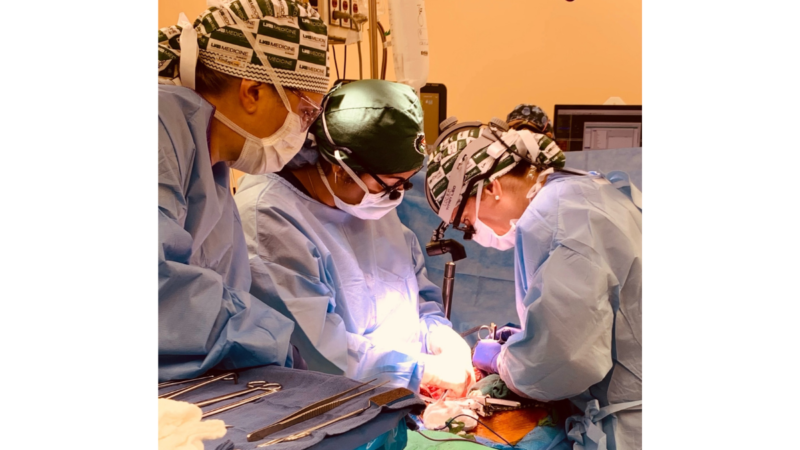UAB surgeons transplant pig kidneys into a human body for the first time
A team of scientists at the University of Alabama at Birmingham is the first to successfully transplant the kidneys of a genetically modified pig into the body of a brain-dead recipient.
The surgery, which took place last September, is detailed in a peer-reviewed article published Thursday in the American Journal of Transplantation.
Upon being transplanted into the human recipient, researchers said the pig kidneys turned pink, and one began to make urine after 23 minutes.
“That is what every transplant is supposed to do, and it was amazing,” said Dr. Jayme Locke, director of UAB’s Comprehensive Transplant Institute and lead surgeon for the study.
The study lasted 77 hours before the recipient was taken off of life support. During that time, the kidneys appeared to function, though one produced more urine than the other, and there were no signs of immediate organ rejection. Additionally, no pig viruses or pig cells were detected in the recipient’s body.
The research is the latest milestone in the field of xenotransplantation and the first time that such a surgery has been described in a peer-reviewed journal.
Locke is hopeful that genetically modified pig organs will one day provide a life-saving solution for thousands of people who die every year waiting for a kidney transplant.
“They have a disease that we have a cure for, but we don’t have enough and we need a radical solution,” Locke said. “We have to find an alternative organ source, and xenotransplantation, I believe, is the answer.”
Locke said UAB’s research will likely be key to gaining approval from the U.S. Food and Drug Administration for a Phase 1 clinical trial, which researchers hope to begin later this year.
The study answered several questions about the viability of genetically modified pig kidneys inside the human body. It also demonstrated a new model of testing research on a brain-dead recipient.
Scientists hope to name the model they tested after the individual in the study, 57-year-old Jim Parsons, who was fatally injured in a motorcycle accident last year.
Parsons’ family, who consented to the research, described him as a compassionate father who sought adventure and was always willing to help.
“Our greatest hope is that this study … will ultimately bring new life to hundreds of thousands of people in the United States and around the world in need of a kidney transplant,” said Parsons’ ex-wife Julie O’Hara. “We’re forever honored that Jim’s gift has an opportunity to give those in need a chance at life.”

Many questions remain about the process of xenotransplantation, but scientists hope it could be an option for patients in the coming decade.
Last fall, surgeons at NYU Langone Health attached a genetically modified pig kidney to the outside of a brain-dead recipient’s leg. Earlier this month, surgeons in Maryland completed the first successful transplant of a pig heart into a living recipient.
EDITOR’S NOTE: UAB holds WBHM’s broadcast license, but our news and business departments operate independently.
‘My role was making movies that mattered,’ says Jodie Foster, as ‘Taxi Driver’ turns 50
Foster was just 12 years old when she starred in the 1976 film. "What luck to have been part of that, our golden age of cinema in the '70s," she says. Her latest film is Vie Privée (A Private Life).
Supreme Court appears likely to uphold state bans on transgender athletes
To date, 27 states have enacted laws barring transgender participation in sports.
Keep an eye out for these new books from big names in January
The new year begins with a host of promising titles from George Saunders, Julian Barnes, Jennette McCurdy, Karl Ove Knausgaard and more. Here's a look ahead at what's publishing this month.
Want to play a Tiny Desk concert? The 2026 Contest is now open for entries
The 2026 Tiny Desk Contest, our annual search for the next great undiscovered artist, is now officially open for entries.
Scott Adams, the controversial cartoonist behind ‘Dilbert,’ dies at 68
Adams announced in May that he was dying of metastatic prostate cancer. Thousands of newspapers carried his strip satirizing office culture from the '90s until a controversy in 2023.
As Iran’s protests continue, Israelis and Palestinians watch closely
There is broad support for the protests among Israeli officials, but Palestinians say they hope the Iranian regime stays in place and the protests die down soon.








